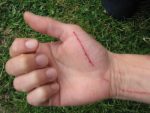Dear fellow animal lovers! Rabbits are cute and lovable. Sure, we all agree to that. They also can be kept as friendly companies as well as livestock. Whether you raise rabbits for their company or their commercial value, keeping them happy and healthy is a must. Remember, their condition may affect you and your family, too.
There are rabbits diseases that can be passed to humans. While some of them are dangerous and deadly, some others may not as dangerous. There are several ways to get infected, and rabbit scratch is one of them. However, we aren’t going to talk about the disease but the rabbit scratch itself.
Let’s say you’re playing or feeding your rabbit and it—accidentally or not—scratches your hand or leg. Rabbits can scratch when kicking out with their back legs or bite you if they feel threatened or angry. Although the wounds are usually minor, rabbits carry bacteria on their skin, feet, and teeth that can lead to a secondary infection. If that happened, what should you do?
Sure prevention is better than cure but rabbits behavior is one thing we can’t control. While happy, healthy and friendly rabbits may rarely attack humans, sometimes shit just happen. Fear not, here we have Essential Steps to Treat Rabbit Scratches at Home
First thing first, you have to evaluate whether the scratch is deep or shallow, then you can decide how to treat your wound. If you have the shallow scratch, do the measures below:
1. Wash your hands
Before you treat the wound, make sure your hands are clean and germ-free. Wash your hands with soap and warm water for about 20 seconds. Make sure to wash between every finger and under nails, too. After that, rinse your hands with clean water.
2. Wash the wound thoroughly
Rinse the scratch wound and area around it with flowing clean water. Don’t use warm or hot water because it may aggravate the bleeding. If the wound is bleeding heavily, stop the bleeding first by applying pressure with a clean towel. Press the towel firmly to the bleeding area until the bleeding subsides. You may also need to elevate the wound above your head.
Wash the wound area carefully with a gentle soap. Don’t scrub the wound as it may get worse. If you get scratched in your upper arm, wash the whole arm, then rinse with clean water.
3. Apply ointment to the scratched area
Treat the scratch with an antiseptic ointment or gel disinfectant such as Neosporin; it contains neomycin, a very effective antibiotic to heal cut injuries. You can apply it three times a day. If you happen to have an allergy to it, consider Bacitracin as a good alternative.
Usually, you don’t need to consume oral antibiotic unless the scratches are infected. Signs of infected wound include increased pain, swelling, redness, or warmth around the wound, presence of red streaks extending from the wound, drainage of pus from the wound, as well as the presence of a high fever
4. Cover the wound
Although a very shallow scratch may not be needing any covering at all, a deeper wound has to be protected by covering it with a dressing or bandage for up to 24 hours. Change the bandage regularly and allow it to be exposed to fresh air as it heals.
Remember the measures above only valid for minor injuries. Call your doctor or go to a clinic immediately if you have this following conditions.
- The scratch is on the face, hand, foot or near a joint.
- The wound does not stop bleeding after 10 minutes of continuous pressure.
- Your wound appears, deep, large or severe.
- You get bitten by a stray or wild rabbit.
- The scratched wound becomes red, hot, swollen or increasingly painful.
- You have a weakened immune system or medical condition that may make a bacterial infection more severe.
- You are not up to date on your Tetanus immunizations.
In the end, while rabbits scratch may seem to be just a trivial thing, you don’t want to neglect it. Left it untreated may cause you a more severe infection. Follow those Essential Steps to Treat Rabbit Scratches above as your first aid and. However, due to the high risk of infection, make sure to consult your doctor for every injury you got from rabbits. Good luck!

